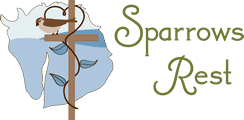Independent Living
Sparrows Rest has obtained all necessary permits to construct an educational building on the property where older youth will learn independent living skills and receive vocational training. The building will also be utilized to provide an after-school program where youth will have the opportunity to receive tutoring, utilize computer stations, and engage in creative and vocational opportunities under the supervision of supportive adults.
Recreational activities will be offered for the children to enjoy the beautiful farm, whether grooming and caring for the animals or assisting with physical chores and projects on the farm.
Equine Assisted Therapy Program
Sparrows Rest utilizes the model of Equine Assisted Therapy established by the Equine Assisted Growth and Learning Association (EAGALA).
Learn more about the Equine Assisted Psychotherapy program (Powerpoint or PDF download).
What is Equine Assisted Therapy?
Equine Assisted Psychotherapy (EAP) incorporates horses experientially for emotional growth and learning. It is a collaborative effort between a licensed therapist and a horse professional working with the client(s) and a horse(s) to address treatment goals. Because of its intensity and effectiveness, it is considered a short-term, or “brief” approach.
The focus of EAP is not riding or horsemanship. Instead, the focus of EAP involves setting up ground activities involving the horses which require the client or group to apply certain skills. Individuals learn about themselves and others by participating in ground activities with the horses, and then processing (or discussing) feelings, behaviors, and patterns. Non-verbal communication, assertiveness, creative thinking and problem-solving, leadership, work, taking responsibility, teamwork and relationships, confidence, and attitude are several examples of the tools utilized and developed by EAP. This experiential approach has been compared to the ropes courses used by therapists, treatment facilities, and human development courses around the world.
EAP is a powerful and effective therapeutic approach that has an incredible impact on individuals, youth, families, and groups. EAP addresses a variety of mental health and human development needs including behavioral issues, attention deficit disorder, PTSD, substance abuse, eating disorders, depression, anxiety, relationship problems and communication needs.
Equine Assisted Learning (EAL) is similar to EAP but has a different focus. EAL still involves the team of mental health professional and horse professional working with the clients and horses. The focus, however, is on education and learning specific skills as defined by the individual or group. Some examples of EAL include improved product sales for a company, leadership skills for a school group, or resiliency training for our military warriors.
Why Horses?
Those who are familiar with horses recognize and understand the ability of horses to influence people in incredibly powerful ways. Developing relationships, training, horsemanship instruction, and caring for horses naturally affect the people involved in a positive manner. Equine Assisted Therapy is not just for “people who like horses.”
Naturally intimidating to many, horses are large and powerful animals. This creates a natural opportunity for some to overcome fear and develop confidence. Working alongside a horse, in spite of those fears, creates confidence and provides wonderful insight when dealing with other intimidating and challenging situations in life.
Like humans, horses are social animals, with defined roles within their herds. They would rather be with their peers. They have distinct personalities, attitudes and moods; an approach that works with one horse won’t necessarily work with another. At times, they seem stubborn and defiant. They like to have fun. In other words, horses provide vast opportunities for metaphorical learning, an effective technique when working with even the most challenging individuals or groups.
Horses require us to work, whether in caring for them or working with them. In an era when immediate gratification and the “easy way” are the norm, horses require people to be engaged in physical and mental work to be successful, a valuable lesson in all aspects of life. Horses provide learning opportunities to teach the benefits of work ethic, responsibility, assertiveness, communication, and healthy relationships.
Most importantly, horses mirror human body language. Many complain, “This horse is stubborn. That horse doesn’t like me,” etc. The lesson is that if they change themselves, the horses respond differently. Horses are honest, which makes them especially powerful messengers.
Transitional Housing
Sparrows Rest will eventually provide a transitional housing program for youth in foster care. The goal is to acquire housing in several areas, namely, the towns of Warrenton, Culpeper and Madison, where youth will have access to public transportation and employment and educational opportunities. The housing units would be renovated to provide clean and safe living spaces for older youth in foster care under the supervision of adults. Select youth will be required to complete an application and interview process, sign a contract and commit to a standard of conduct and productivity to be eligible for the program.

